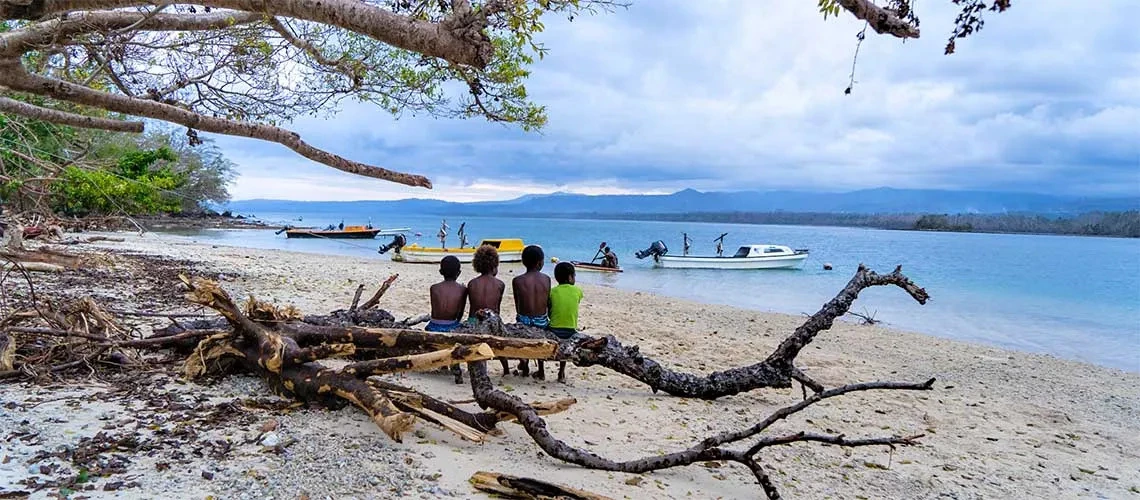 Children sitting on beach in Tongoa Island, Vanuatu after Tropical Cyclone Harold hit in April 2020
Children sitting on beach in Tongoa Island, Vanuatu after Tropical Cyclone Harold hit in April 2020
The world is facing a perfect storm of intertwined challenges—from the intensifying climate impacts and growing pandemic risks to deepening conflicts and the slowest half-decade of gross domestic product growth in 30 years. These overlapping crises are not only a “new normal” for countries, but also pose an unprecedented threat to poverty reduction and economic development, making it harder for families to put food on the table, send their children to school, and cope with worsening natural disasters. The past three years have made one thing clear: we can no longer afford to treat crises as surprises. Developing countries need more and better tools to manage the multiplying challenges they face. As we rethink development in the age of crisis, enhancing crisis preparedness and response and building resilience must be central to our solutions .
At the World Bank, we are implementing ambitious reforms to transform the way we support countries in this challenging time. A critical part of this transformation is a new crisis preparedness and response toolkit. These tools will help governments better prepare for and respond to crises while facing fewer trade-offs between their development priorities and emergency financing needs .
We are moving fast to put this toolkit into action, because we know that immediate access to funding for emergency response saves lives. This week, we are introducing a new Rapid Response Option, which will allow countries to quickly repurpose a portion of their unused World Bank financing portfolio for emergencies. This mechanism will help maximize the resources governments already have to meet the urgent needs of their people, such as providing shelter, food, and water. Critically, we will also support governments in advance planning to ensure the swift utilization of crisis response financing.
We are also improving countries’ access to pre-arranged financing, boosting their financial capacity against future shocks. Countries will have better access to contingent resources and immediate crisis response financing without needing to commit resources that could be used for other development goals. Countries can leverage these resources to prepare for natural disasters, health emergencies, and other shocks through two of our existing lending tools: Development Policy Financing and Investment Project Financing. Countries will have to undertake crisis preparedness reforms and other institutional strengthening measures to further leverage these new tools, fostering resilience in the long run.
Catastrophe insurance can play an important role in crisis mitigation. We are offering all countries the option to embed catastrophe bonds, insurance, and other risk management products into our financing operations. Governments could then be eligible for a payout in the event of a crisis, without taking on more debt. Building on existing tools such as catastrophe bonds, this approach will mobilize private capital and pass the risks of high-intensity but low-frequency disasters to international reinsurance and capital markets. Working with donors, we aim to ensure these insurance products are accessible to lower-income countries.
As part of the toolkit, the World Bank has also expanded the Climate Resilient Debt Clauses, which were recently introduced to extend a lifeline to small islands and other small states struck by natural disasters, allowing governments to focus on disaster recovery instead of debt repayment when catastrophes strike. The Climate Resilient Debt Clauses now cover all existing loans in eligible countries, while allowing borrowers to defer interest and fee payments and enabling fees to be covered by concessional resources.
This new set of tools will, for the first time, allow the World Bank to offer all client countries contingent financing to help respond to crisis . For example, a hurricane-affected country can now embed the Rapid Response Option in its existing World Bank lending portfolio, allowing it to quickly redirect some of its undisbursed funds for emergency response if such phenomena do occur. Or the country may opt for contingent budget support to put in place a strong disaster preparedness program and ensure that financing is immediately available for a disaster situation. Enhanced insurance mechanisms will add another layer of protection. Through a catastrophe bond, facilitated by a Bank financing operation, private bondholders will be able to provide a payout to the government in the event of a hurricane of a specific magnitude, without the country incurring additional debt.
This suite of new tools marks a significant step in our extensive efforts to strengthen crisis preparedness and resilience. And we are doing much more. We are increasingly helping countries assess the risks they face through our Country Climate and Development Reports, for instance. Our new approach to Paris Alignment means we now screen 100 percent of our operations for climate resilience. Our strengthened country engagement model will support country investments and reforms to enhance crisis preparedness. We are also ramping up our work with private sector clients. The International Finance Corporation is designing a private sector-led crisis response solution to help financial institutions mitigate the impact of natural disasters resulting from climate change. The Multilateral Investment Guarantee Agency is working with lenders and the private insurance industry to better integrate the impacts of climate change on loans to the public sector with instruments such as parametric risk insurance. The Pandemic Fund, an example of our targeted funds, is also supporting countries to strengthen pandemic prevention, preparedness, and response.
The World Bank Group was created to help countries confront tough times, and we are doubling down on our support in this new era of crisis . With innovation and commitment, our efforts will equip nations with the resources they need to build a more resilient future, drive impactful development, and ultimately contribute to the vision of a world free of poverty on a livable planet.



Join the Conversation